Exercise and bone tumor
Influence of a prehabilitative exercise intervention on structural and functional parameters in children and adolescents with a bone tumor
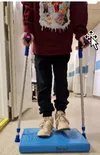
This study aims to investigate the effect of an individualized training program, implemented during neoadjuvant chemotherapy. This explorative approach of prehabilitation might mitigate the degradation processes of musculoskeletal structures and associated functional limitations during and after acute therapy for the treatment of bone tumors in children and adolescents.
Chair: Preventive Pediatrics, Project Website: Kinderklinik Schwabing, Funding: Initiative krebskranke Kinder München e.V.,
Focus Topic: Physical Health
Cardiac Function after Childhood Cancer
Early Detection of Cardiac Functional Impairments Following Potentially Cardiotoxic Cancer Therapy in Childhood and Adolescence – A Feasibility Study
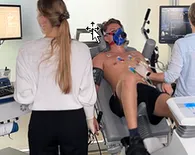
Cardiovascular late effects following childhood cancer are problematic. The early detection of subclinical changes is scarcely achievable with conventional diagnostic methods, but may be successful under physical stress. This study examines cardiac function in individuals aged 10-25 years in the first and fifth year post-therapy using stress echocardiography and spiroergometry, comparing the results with those of healthy control subjects
Chair: Preventive Pediatrics, Project Website: Kinderklinik Schwabing, Funding: German Heart Research Foundation
Focus Topic: Physical Health
fit4future
Evaluation of the implementation and effectiveness of the holistic health promotion program "fit4future" in daycare centers and primary schools.
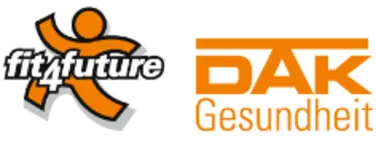
Since 2016, the fit4future program, supported by DAK-Gesundheit and the fit4future foundation Germany, has encouraged children and adolescents to lead a healthy lifestyle. In 2022, a new four-year phase began, focusing on empowering schools and daycare centers to independently implement health promotion activities. This is done through workshops, lesson series, and digital materials. The working group evaluates implementation and effectiveness using quantitative and qualitative methods, allowing the program to continuously adapt and advance health promotion research.
Chair: Didactics in Sport and Health, Project Website: fit4future, Funding: DAK Gesundheit
Focus Topic: Physical Health, Mental Health, School Health
Interaction
Seeing students through teacher eyes
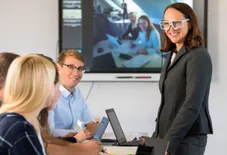
The project "Interaction – Seeing students through teacher eyes" studies teacher-student interactions, focusing on teachers' diagnostic competence. According to adaptive teaching concepts, teachers who accurately assess students’ motivation, interest, and cognitive abilities can better tailor instruction to individual needs, leading to improved learning outcomes. It's especially important to identify students who overestimate or underestimate their abilities. However, current findings show that teachers mainly interact with students they perceive as high-performing to maintain a smooth lesson flow. Educational researchers also highlight that teachers often lack diagnostic skills, particularly in recognizing inconsistencies in students' cognitive and motivational characteristics.
Chair: Educational Psychology, Project Website: Interaction, Funding: DFG
Focus Topic: School Health
Social participation after cancer – SupaTeen
Social inequalities in participation and activity among children and adolescents with leukemia, brain tumors, and sarcomas

Current medical treatments result in high survival rates for childhood cancer. However, various side effects and late consequences can significantly impact the activity and participation of affected children and adolescents. This project aims to investigate the influence of social determinants, especially parental social status, on the participation and activity of children and adolescents (ages 10 to 18) with leukemia, brain tumors, and sarcomas. Data will be collected through a prospective multicenter study at three time points: t1 (within the first month after diagnosis), t2 (after therapy completion), and t3 (six months post-therapy). The project seeks to provide valuable insights into social risk groups to identify and support children and adolescents in high-risk situations early on.
Chair: Social Determinants of Health, Project Website: SupaTeen, Funding: Deutsche Krebshilfe
Focus Topic: Physical Health, Mental Health, School Health
Gendered Impacts of the COVID-19 Pandemic on Adolescents in LMICs
Impact of the COVID-19 Pandemic on Child Marriage, Sexual and Reproductive Health, and Domestic Violence in India and Zambia

The project draws on primary quantitative and qualitative data collected among adolescent girls in Zambia and India to assess the impact of the COVID-19 pandemic on gender inequality in the Global South. It thereby puts specific focus on three central indicators of gender inequality, namely (1) gender-based violence (SDG target 5.2), (2) child and forced marriage (SDG target 5.3), and (3) sexual and reproductive health (SDG target 5.6).
Chair: Professorship of Global Health, Project Website: COVID-19, Funding: DFG,
Focus Topic: Physical Health
TENSIONED - Holistic health in focus
Exercise, fitness, stress, sleep and blood vessels - For a strong future for adults with congenital heart defects
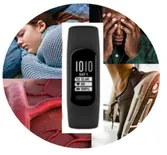
This study includes stress, exercise, sleep, physical fitness and the vascular status of the patients. Activity, stress and sleep are measured over seven days using wearable technology - watches that make it possible to collect large amounts of data around the clock and evaluate it pseudonymously. We hope that these technical possibilities will enable us to make precise statements about the three parameters and also provide important conclusions about the fitness and vascular structures of these patients.
Chair: Preventive Pediatrics, Project Website: Tensioned, Funding: Fördergemeinschaft Deutsche Kinderherzzentren e.V
Focus Topic: Physical Health, Mental Health
MuCAYA+
Munich Cardiovascular Adaptation in Young Athletes Study
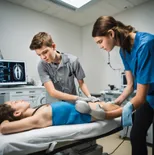
Competitive sports in childhood and adolescence often require weekly training loads of 10-20 hours, far exceeding the WHO recommended 60 minutes of daily physical activity. This can negatively impact the cardiovascular system, similar to adult athletes. Therefore, early monitoring of cardiovascular health in young athletes is of great importance. The MuCAYA+ study is a project funded by the DFG, which over three years explores the effects of intense physical activity on children and adolescents. Annually, 250 young athletes are examined in the sports medicine outpatient clinic to analyze the relationship between cardiovascular adaptations, exercise and performance, body composition, eating habits and biochemical factors.
Chair: Preventive Pediatrics, Project Website: Mucaya+, Funding: Deutsche Forschungsgemeinschaft: DFG
Focus Topic: Physical Health
kidsTUMove goes Europe – cordially fit
Empowering Chronically Ill Children and Adolescents Through Sports
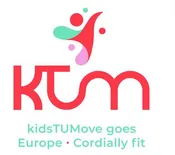
The project aims to provide children and adolescents with chronic diseases or post-traumatic stress disorder with access to sports programs and physical activity. The project is funded by the EU until June 2025. Our chair is coordinating the consortium. The partnership includes universities and organizations from Greece, Italy, Spain and Portugal. In cooperation, a training manual for exercise instructors will be developed to train affected persons in a professional and sustainable way. In addition, the establishment of an online platform will make information and sports programs easily accessible to all groups of the European population and build a network of health experts. For more information, visit the project website or the social channels of KTM goes Europe - cordially fit.
Chair: Preventive Pediatrics, Project Website: Insta: ktm_kidstumove, X: @kidsTUMoveEU, Funding: European Union - ERASMUS+
Focus Topic: Physical Health, Mental Health
Schools4Health

The EU4Health-funded European research network Schools4Health (2023-2026) aims to introduce, strengthen, and sustain the health promoting school (HPS) approach of the World Health Organization in Europe.
Schools4Health sets out the goal to transform schools into health-promoting schools, involving education and health stakeholders. In the project, 16 schools from eight EU countries will use existing school health intervention projects, with resources accessible online. These will be adapted to the specific context and subsequently implemented and evaluated with the involvement of various local stakeholders. The resources created will be summarized and made accessible online in the Schools4Health hub.
Chair: Professorship of Health Literacy, Project Website: TUM Health Literacy Unit website, Funding: European Commission
Focus Topic: School Health Literacy, Health Promoting Schools
Heroes of Nature

"Naturhelden” (Heroes of Nature) is an environmental protection project at school for young students in the 3rd and 4th grades at primary and special schools. Overall, it reaches 500 schools nationwide. The goal is to raise children's awareness of environmental protection, health and sustainable behavior. With outdoor events, action days and practical content, the project promotes empowerment, awareness and participation. The TUM Professorship of Health Literacy provides scientific support for the project and evaluates its impact.
Chair: Professorship of Health Literacy, Project Website: Naturhelden website, TUM Health Literacy Unit website , Funding: Stiftung RTL – Wir helfen Kindern e. V.
Focus Topic: School Health, Climate and Environmental Health
KoKo
Giving a voice to children and adolescents: school students as co-researchers to develop a conceptual model of health literacy
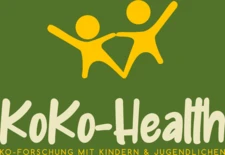
The project on health literacy of children and adolescents was launched in 2023 and will run for three years until 2025. Donau University Krems, Gesundheit Österreich GmbH and TU Munich are jointly developing a child- and adolescent-centered conceptual health literacy model. Existing definitions and models of health literacy do not consider children´s perspectives sufficiently. Therefore, children and adolescents will be actively involved as co-researchers in order to incorporate their experiences and perspectives about health literacy.
Chair: Professorship of Health Literacy, Project Website: KoKo Health website, Funding: Gesellschaft für Forschungsförderung Niederösterreich
Focus Topic: Physical Health
Health Promotion Academy
Health Information and Health Literacy for Schools

In order to develop an information platform for healthy living, the TUM Professorship of Health Literacy collaborate with Helmholtz Munich and Fulda University of Applied Sciences in the "Health Promotion Academy." The project, funded by AOK Bayern, has developed and evaluated an information and learning platform focusing healthy living to enhance health literacy among secondary school students and teachers.
Chair: Professorship of Health Literacy, Project Website: Health Promotion Academy website, Funding: AOK Bavaria
Focus Topic: School Health
HeLitRegio-Bavaria
Organizational health literacy for kindergartens and preschools for children

The "Heath Literate Health Region Bavaria (Gesundheitskompetente Gesundheitsregionenplus in Bayern (GeKoRegio-Bayern))" project aims to develop an organizational health literacy framework for preschool and kindergarten settings in collaboration with the Bavarian Gesundheitsregionplus in the Neu-Ulm region, promoting health literacy among children, staff, and parents.
To achieve the goal, a guide for health literate kindergartens and preschools has been developed, including health literacy standards and indicators, and will be implemented and evaluated.
Chair: Professorship of Health Literacy, Project Website: HeLit-PreSchools website, Funding: Bavarian State Ministry for Health and Nursing
Focus Topic: School Health, Mental Health, Environmental and Climate Health
HeLit-Schools
Organizational Development for Strengthening Health Literacy in the Setting School (HeLit-Schools)

The aim of the project "Health Literate Schools (HeLit-Schools)" is to adapt the organizational health literacy framework to the context of schools in Germany.
By using a whole-of-school approach, we aim at optimizing school structures and networks in relation to health literacy. On the short-term, the framework should facilitate the promotion of health literacy in different population groups within and outside of school. In the mid-and long-term, this will contribute to sustainably strengthening personal health literacy of school-aged children and the organizational health literacy of schools.
Chair: Professorship of Health Literacy, Project Website: HeLit-Schools website, Funding: School Health Literacy, Organizational Health Literacy
Focus Topic: chool Health, Mental Health, Environmental and Climate Health
DURCHBLICKT!
Digital Health Literacy in Schools

The 'DURCHBLICKT!' research consortium aims to investigate the state of digital health literacy in schools for the first time in Germany, including students, teachers, and staff. The TUM health literacy research unit is working with the University of Potsdam to develop and evaluate digital situational analysis tools, questionnaires, and interventions to promote digital health literacy in the school context. The materials are available at an online platform for students, teachers, and parents.
Chair: Professorship of Health Literacy, Project Website: Durchblickt website, Funding: BARMER
Focus Topic: School Health
BLISS
Boosting Health Literacy for School Students
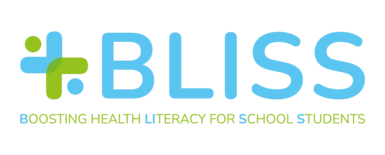
BLISS was funded by the EU Erasmus+ program and aimed at promoting digital health literacy in the school context through educational, pedagogical and social interventions. The primary target groups are schoolchildren and teachers. The digital health literacy curriculum for schools has been released and can be downloaded on the project website.
Chair: Professorship of Health Literacy, Project Website: BLISS website, Funding: ERASMUS+
Focus Topic: School Health
WHO Collaborating Centre for Health Literacy

The WHO Collaborating Centre for Health Literacy at the Department of Health and Sport Sciences at the TUM School of Medicine and Health was established on December 8, 2023 and is headed by Prof. Dr. Orkan Okan. It supports the WHO in the implementation of its global agenda to strengthen health literacy. The aim is to develop national strategies and policies to promote a healthy population in each WHO member state. The Center works closely with the WHO headquarters in Geneva and the Regional Office for Europe in Copenhagen.
Chair: Professorship of Health Literacy, Project Website: TUM Health Literacy Unit website, Funding:
Focus Topic: School Health, Physical Health, Mental Health, Climate and Environmental Health
TUM4Health
The student health management program at TUM
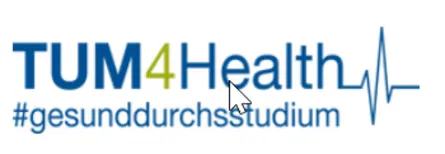
TUM4Health is TUM's holistic student health management program. The offers are demand-oriented, target group-specific, low-threshold and always free of charge for TUM students. TUM4Health is an exclusive and far-reaching offer for TUM students, with the aim of making TUM an outstanding health-promoting university and creating a good study (work) life balance for students. The focus is on training and strengthening the resources of each individual, developing health awareness and changing the living environment. To this end, all key health-promoting levels are included: Strengthening the skills and resources of each individual, Development of health-promoting framework conditions and Participation in the "TUM" living environment. Based on targeted data collection of health parameters (TUM health survey, own sports medicine measurements, quick surveys on well-being, etc.), the offers of TUM4Health are always adapted to the needs of the students in order to support sustainable and healthy development.
Chair, Preventive Pediatrics, Project Webiste: TUM4Health , Funding: Techniker Krankenkasse
Focus Topic: Physical Health, Mental Health, School/Student Health